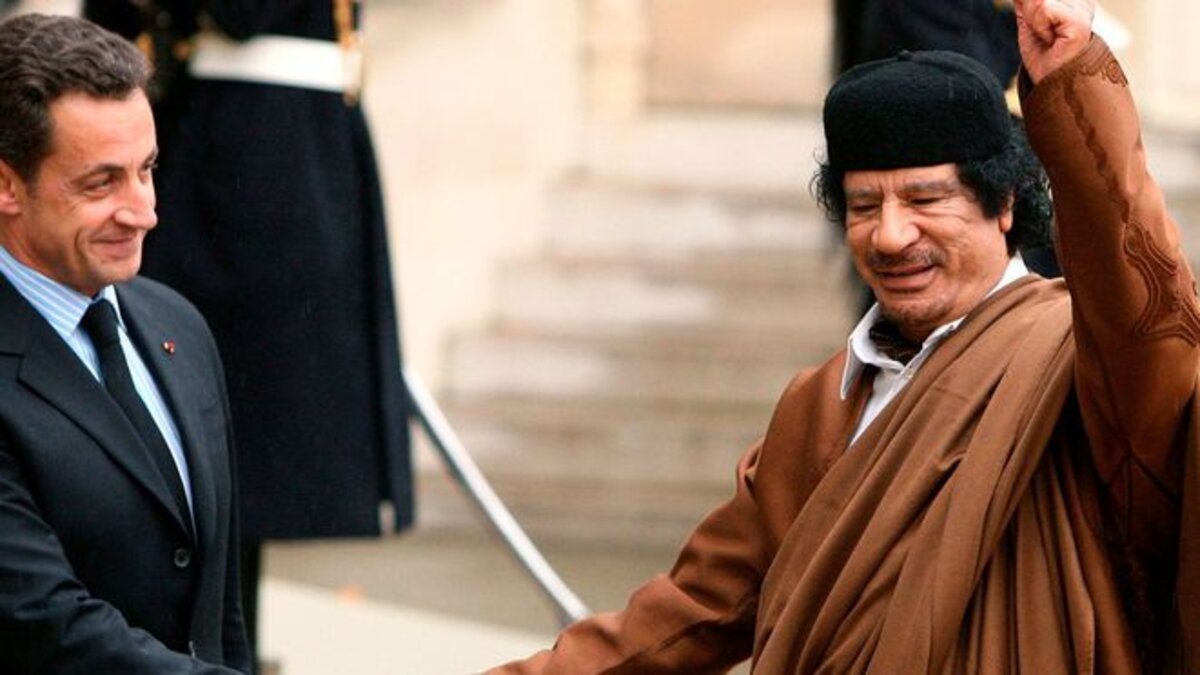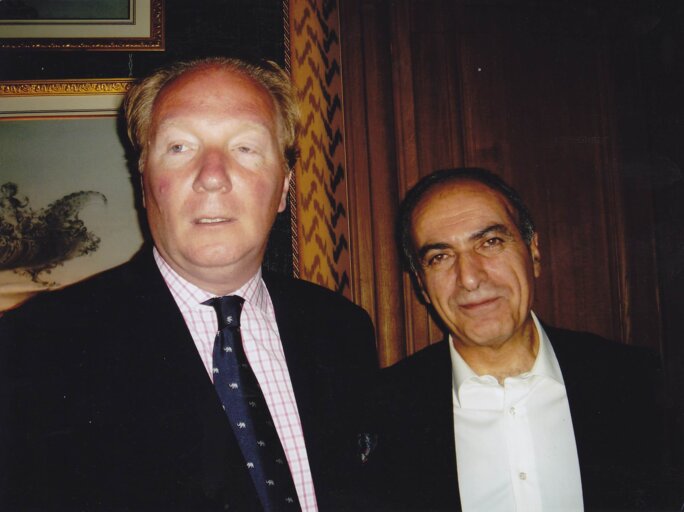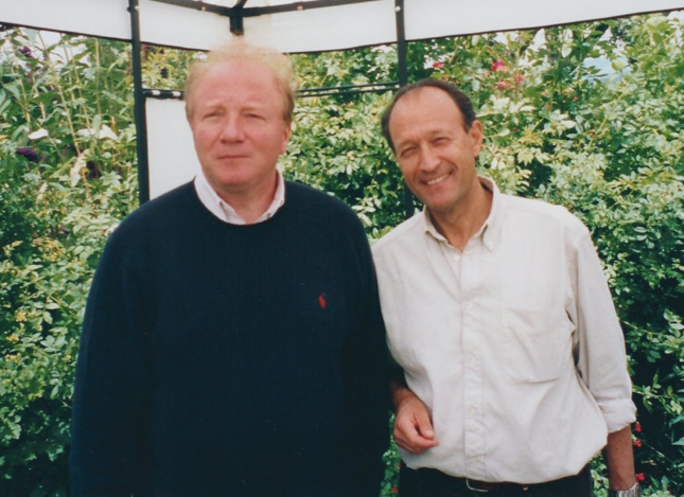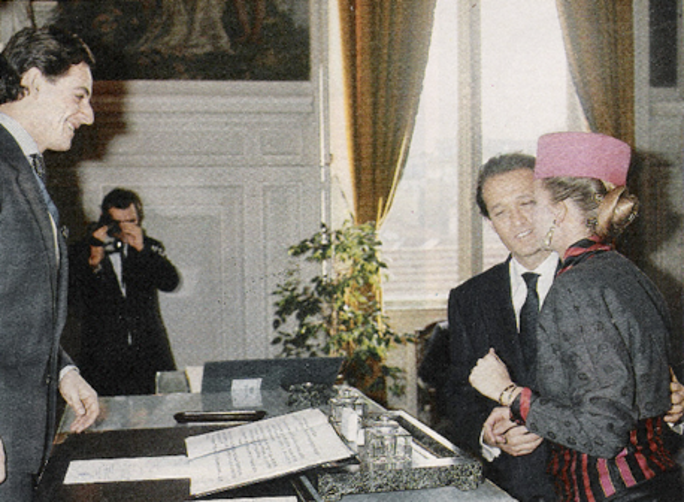Thierry Gaubert, a longstanding aide to former French president Nicolas Sarkozy, received 440,000 euros in a secret offshore bank account paid by the regime of the late Libyan dictator Muammar Gaddafi one year before Sarkozy’s 2007 election campaign, according to bank documents consulted by Mediapart.
Sarkozy, 64, was placed under investigation in March 2018 for “illicit funding of an electoral campaign”, “receiving and embezzling public funds” and “passive corruption” in an ongoing judicial investigation into suspected illegal funding of his 2007 presidential election campaign by the Gaddafi regime. Under French law, a magistrate can place a suspect under investigation on the condition that there is “serious or corroborating” evidence that they committed, or assisted the committal of, a crime. Charges are only brought in the event that, at the end of an investigation, the magistrates decide the suspects should stand trial.
The judicial probe followed Mediapart’s revelations, beginning in 2011, of evidence suggesting the Libyan dictator partly funded the 2007 campaign, which resulted in Sarkozy’s election.

Enlargement : Illustration 1

The documents concerning the transfer of the 440,000 euros into Gaubert's account in The Bahamas represent the first established evidence implicating a member of Sarkozy’s entourage in a bank transfer of money from the Gaddafi regime before the 2007 election campaign.
Questioned by Mediapart, Gaubert firmly denied the transfer involved money from the Libyan authorities.
Gaubert, 68, who worked closely with Sarkozy in the 1980s when the latter was mayor of the wealthy Paris suburb of Neuilly-sur Seine, and subsequently in 1994 as Sarkozy’s deputy chief of staff when he was budget minister, is standing trial in Paris this week on charges of “tax fraud” and “aggravated money laundering”.
Last month he was one of six defendants in a separate Paris trial accused of playing leading roles in the alleged payment of illegal cash kickbacks from French arms sales in the 1990s to Saudi Arabia and Pakistan to be used to finance the 1995 presidential election campaign of former French prime minister Édouard Balladur. Public prosecutors at the trial called for Gaubert, who denies the charges against him, to be handed a four-year prison sentence, two of them suspended. The court magistrates are due to announce their verdict next April.
Balladur, now aged 90, who a senior prosecutor has recommended should stand trial over the alleged scam, and who was France’s prime minister between 1993 and 1995, is regarded as a political mentor for Sarkozy, who served as Balladur’s budget minister and also as his campaign spokesman in the 1995 presidential election, which was finally won by Jacques Chirac.
At Gaubert’s trial this week on tax fraud and money laundering charges, the court will hear evidence gathered by the financial crime branch of the prosecution services, the PNF, about the movements on several accounts held by him with the Swiss banking group Pictet.
Mediapart has learnt that it was into one of the accounts he held with Pictet in The Bahamas – account number 188512, opened on August 13th 2001 – that a transfer of 440,000 euros was made on February 8th 2006 from an offshore company called Rossfield Limited.
Rossfield, a shell company, in fact belonged to the Paris-based French-Lebanese arms broker and intermediary Ziad Takieddine, who is a key figure among the suspects in both the investigation into the alleged Libyan funding of Sarkozy’s 2007 election campaign, and also that into the alleged illegal funding of Balladur’s campaign (for which Takieddine stood trial with Gaubert last month, when prosecutors called for him to be handed a five-year prison sentence).
Bank accounts belonging to Takieddine’s company Rossfield confirm it made a bank transfer of 440,000 euros on the date of February 8th 2006, but the destination account is hidden behind a code number.
The money received into Gaubert’s account in The Bahamas was re-transferred the following day onto another account, the beneficiary of which the French investigation has failed to identify.
One week earlier, on January 31st 2006, Rossfield had received a sum of 3 million euros from the Libyan treasury. During 2006, Rossfield was the beneficiary of a total of 6 million euros paid into its account in Lebanon by the Gaddafi regime during 2006: apart from the 3 million euros received in January of that year, another 1 million euros was transferred to it by Tripoli in May, and another two payments, each for 1 million euros, were sent by the regime in November.
In the investigation into Gaubert’s alleged tax evasion, the police were unable to identify the true owner of Rossfield. However, in the separate and ongoing judicial investigation into Gaddafi’s alleged funding of Sarkozy’s election bid, a different French police unit succeeded in identifying Ziad Takieddine as the owner. Because of the separation of the two investigations, each led in isolation of the other, the connection between the money received by Gaubert and that sent by Takieddine was never made.
Contacted by Mediapart by phone, Gaubert said that “Rossfield is not at all Mr Takieddine”, despite the documented evidence to the contrary, and that the sum he received was “not at all Libyan money”, adding: “That’s not at all my version of things. I’ll give my explanations at court.” He was referring to his trial this week, which is due to last until Wednesday.
But he may now be called upon to also explain himself to the judicial investigation into the Gaddafi funding allegations. The discovery of the bank transfer made by Takieddine to Gaubert contradicts one of the arguments recently developed by Sarkozy’s allies by which they claim the sums which it has been established were sent by the Gaddafi regime to Takieddine were kept by the intermediary alone, and not redistributed.
It also represents a possible turning point in the investigation: not only because it is now evident that Gaubert, a longstanding loyal figure among Sarkozy’s entourage, and a close friend of another of the former president’s key allies, Brice Hortefeux (who held three successive ministerial posts under Sarkozy’s presidency, including that of interior minister), received a payment from Rossfield in 2006, but also because it was discovered that Takieddine made further payments from the Libyan sums he received which he sent to accounts in tax havens during 2006, 2007 and 2008.

Enlargement : Illustration 2

The 440,000-euro payment to Gaubert in February 2006 came just six weeks after a secret visit Brice Hortefeux made to Tripoli, on December 21st 2005. Hortefeux was then a junior minister for local authorities under the presidency of Jacques Chirac, when Sarkozy was interior minister and openly preparing his future presidential bid. The visit, a highly unusual one for a junior minister concerned with local authorities in France, was in the context of a series of contacts with the Gaddafi regime by Sarkozy’s entourage, in which Takieddine played a key role as intermediary.
Hortefeux travelled to Tripoli to meet with Gaddafi’s brother-in-law and chief of the Libyan military intelligence service, Abdullah Senussi, who a French court in 1999 had handed, in his absence, a life sentence for masterminding the 1989 bombing of a French UTA airline DC10 passenger plane over Niger, in which 170 people lost their lives.
Hortefeux’s meeting with Senussi was in the presence only of Ziad Takieddine, who served as go-between and interpreter. The fact that no-one else was present, and above all no French official of any sort (such as a diplomat, security officer or official translator) was also highly unusual for a junior minister visiting a senior member of a foreign government.
In statements they have separately given to the French judicial investigation into the suspected funding by Tripoli of Sarkozy’s campaign, both Senussi, now detained in Libya, and Takieddine testified that the secret funding was the subject of the talks with Hortefeux in the Libyan capital on December 21st 2006. Senussi also said that he was given banking details during the discussions.
Hortefeux has firmly denied the accounts by Senussi and Takieddine. He has said that the discussions with Gaddafi’s security chief dealt with migratory issues, but neither he nor Senussi, nor Takieddine were officially involved in such matters, while the secrecy of the talks, without the presence of any French officials, also appears surprising for a face-to-face meeting on migration issues.
Questioned by Mediapart about the payment made by Rossfield to Thierry Gaubert, Hortefeux said he was not aware of any such bank transfers. “You’re talking to me about a transfer about which I haven’t heard mention,” he said. “I know nothing about Libyan transfers or transfers by Mr Takieddine except from the press, and even less about transfers that are made to Thierry Gaubert. I am a friend of Thierry Gaubert, but not to the point of knowing about his income, his bank statements and his transfers. I have no detail on this, none.” Hortefeux added that he felt sure that the identification of the account to which the 440,000 euros was sent by Rossfield would demonstrate that it did “not concern” Gaubert.
It was Thierry Gaubert who introduced Ziad Takieddine to Brice Hortefeux in the early 2000s. As illustrated by numerous photos previously published by Mediapart, Takieddine and Hortefeux were to subsequently socialise together, with their spouses at the Riviera villa belonging to Takieddine at Cap d’Antibes, on his yacht and at parties thrown at his Paris town house. Their association was notably close after Takieddine and Hortefeux were both given the mission by the interior ministry, when Nicolas Sarkozy was interior minister, of negotiating arms contracts with Saudi Arabia and later Libya.
In a statement given to the judicial investigation into the suspected Libyan funding of Sarkozy’s 2007 election campaign, Thierry Gaubert said: “I was the only French non-Lebanese friend [of Takieddine]. He was flattered to rub shoulders with political and media figures who I presented to him, notably Messrs Hortefeux and Copé.” Jean-François Copé, who is also featured on photos relaxing with Hortefeux and Takieddine on the Riviera, and on a holiday trip with the intermediary in Lebanon, was budget minister from 2004 to 2007 and, later, secretary general of the conservative UMP party from 2010 to 2012.
Both Gaubert and Takieddine carefully hid the nature, provenance and the destination of the February 2006 bank transfer of 440,000 euros to Gaubert’s account in The Bahamas, which it is now established came from Tripoli.
When Gaubert was questioned in the judicial investigation that resulted in him being charged and sent for trial this week for tax fraud and money laundering, he said that the sum, like other suspicious amounts that went into his account in The Bahamas at around the same time, related to a “return on investments” from property deals he had carried out between 2002 and 2004.
But Takieddine's company Rossfield did not deal with property and, moreover, it was set up at the end of 2004 and shows no banking activity until November 2005, when an account was opened at the International Bank of Lebanon (IBL). Meanwhile, in its summary report of January 2019, the financial crimes prosecution unit, the PNF, noted that Gaubert had not supplied “any proof of these supposed property transactions”.

Enlargement : Illustration 3

When Takieddine was pressed to explain the mention of “OLINE (Swiss)” which featured in the February 8th 2006 money transfer from his company Rossfield – thus hiding Gaubert's identity – Takieddine stated that “OLINE” was “one of the companies in Geneva which was a personal company. I used it for my travel and personal expenses.” In reality Takieddine owned no company of this name in Geneva nor anywhere else. Meanwhile the bank slips obtained by Mediapart show that the full name against Gaubert's account in the Bahamas is “THE CACTUS TRUST OLIN”.
Read backwards, the name “OLIN” is “NILO”, and Nilo is the name of the town in Colombia where in 2000 Gaubert had a vast, secluded property built, which Mediapart visited in 2011. Ziad Takieddine visited the property with his wife in December 2002. “Cactus” was the name given to the property, and also to a trust managed in the Bahamas by the Pictet bank.
Questioned by Mediapart, Takieddine declined to comment.
In a filmed interview with Mediapart in November 2016, Takieddine said that he transported suitcases of Libyan cash, up to a total of 5 million euros, which he handed to Sarkozy's longstanding chief of staff Claude Guéant and Sarkozy himself (who was then interior minister) at the end of 2006 and the start of 2007. But he has always denied that the alleged Libyan funding was made via personal bank accounts, contrary to what Abdullah Senussi had said in his statements to the French judicial investigation.
When questioned by the investigators in 2017, Senussi spoke about a transfer of 7 million euros to Sarkozy's campaign. “This sum was indeed transferred in several [payments] by the Libyan Foreign Bank on the instructions of the Libyan central bank and at the request of the intelligence services’ directorate,” he said.
The French investigation has concluded that the Libyan authorities sent the money to Rossfield in three batches in 2006 via the “Sector of Public Treasury (Tripoli, Libya)” – a sum of 2,900,900 euros credited on January 31st – and the “Central intelligence Unit (Tripoli Libya)”, which involved a sum of 1,001,173 euros credited on May 25th, and 2,000,000 euros credited on November 21st.
Questioned again, on February 5th 2019, Senussi stated that during the meeting with Hortefeux he had received “a piece of paper on which was written the name of a bank and an account number”. Senussi said Hortefeux told him “it was the account into which should be sent the money paid [by Libya] in support of Sarkozy’s electoral campaign”.
“I kept a photo of this note, a copy at my home, but the bombings that destroyed my house demolished everything,” Senussi added in his statement, referring to the Nato-led airstrikes, essentially involving French and British aircraft, launched against the Gaddafi regime in 2011.
Questioned in turn by the magistrates leading the investigation, Brice Hortefeux denied Senussi’s account.
The Libyan bank connection with Gaubert helps make sense of several discoveries by the judicial investigation, and which contradict Gaubert’s insistence that he had no link with the alleged Libyan funding. During a series of police searches carried out on July 5th 2011 both at his home and his office at the Caisse d'Épargne bank where he worked, a document was found on his computer containing the passport number and telephone number of a man called Nouri el-Mismari, who was Gaddafi's director of protocol. Police also found a fax dated October 22nd 2010 which corresponded to a telegram issued the same day by Interpol targeting Mismari, who is reportedly one of the first senior figures of the Libyan regime to have defected when civil war broke out in the country in 2011.

According to the visitor logs at the French presidential office, the Élysée Palace, Mismari went there on four occasions in 2007 and 2008 to meet with Claude Guéant, then chief of staff to Nicolas Sarkozy, and also Sarkozy’s diplomatic advisor Boris Boillon. In 2013, after Sarkozy had left office, Boillon was arrested as he prepared to board a Belgium-bound train at the Gare du Nord railway station in Paris when it was discovered he was carrying a sum of 350,000 euros and 40,000 dollars in several bags.
During the searches of Gaubert's home and office police officers also found other Libyan documents, in particular agreements reached between Takieddine and the French oil group Total relating to the exploitation of natural gas deposits in Libya. However, the discussions about this project – which never came to fruition – had started between Total and the Libyans at the end of 2007, and Takieddine only formally joined the negotiations in 2008 – after the Libyan transfer of money had ended up in Gaubert's account in 2006.
Meanwhile, other documents obtained by the investigation, notably emails, showed that after Sarkozy was appointed as interior minister in 2002, Thierry Gaubert, Brice Hortefeux and Ziad Takieddine formed a very active backroom group. A police report about one email sent by Gaubert to Hortefeux's secretariat at the Ministry of the Interior (Hortefeux was then a special advisor to Sarkozy) noted: “Gaubert indicates that he has to give an important letter to BH [editor's note, Brice Hortefeux] from ZT [Ziad Takieddine] and that [the latter] wants to speak to him about it.”
When, beginning in 2011, Mediapart published a series of investigations revealing the important role played by Takieddine within Sarkozy's inner circle, both Gaubert and Hortefeux became clearly concerned, as police phone taps were to show. On September 14th 2011, as Takieddine was becoming increasingly embroiled in the so-called Karachi affair, Gaubert phoned Hortefeux and spoke about his fears that the judicial investigation into the affair might extend to other sensitive areas. “No, no, I think it's spread to other subjects, in my opinion, it's spread to the rest,” said Gaubert.
In the investigation into the financial side to the Karachi affair – the secret kickbacks on arms deals suspected of being used to fund former French prime minister Édouard Balladur's 1995 presidential election campaign – Gaubert had been suspected of taking delivery in Switzerland – along with Takieddine – of money requested by Balladur's campaign director Nicolas Bazire, and of having then transported that money into France.
That operation, which Gaubert denies being involved in, was alleged to have taken place in the spring of 1995, after Gaubert had left his job as deputy chief of staff to then budget minister Sarkozy, whose then chief of staff was Brice Hortefeux.
Takieddine, who had given a detailed statement on the alleged money laundering during the investigation, went back on his evidence during the Paris trial last month at which he, Gaubert, Bazire and three others appeared on charges of organising the alleged scam.
-------------------------
If you have information of public interest you would like to pass on to Mediapart for investigation you can contact us at this email address: enquete@mediapart.fr. If you wish to send us documents for our scrutiny via our highly secure platform please go to https://www.frenchleaks.fr/ which is presented in both English and French.
-------------------------
- The original French version of this report can be found here.
English version by Michael Streeter and Graham Tearse


